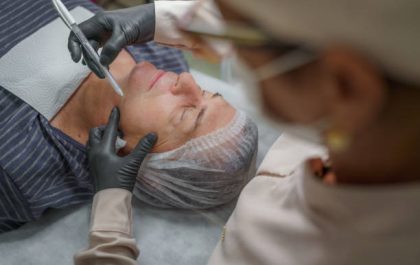Introduction:
The face, being our most expressive feature, reflects our emotions, experiences, and overall health. As the most visible part of our body, maintaining a healthy and radiant complexion is a goal for many. This article will delve into the world of facial care, offering insights into the importance of a proper skincare routine, key practices for maintaining healthy skin, and the benefits of professional facial treatments, including the increasingly popular “facial courses.”
The Basics of Facial Care:
- Cleansing: The foundation of any effective skincare routine and facial course is thorough cleansing. Cleansing removes dirt, oil, and impurities that accumulate on the skin throughout the day. Choose a gentle cleanser suitable for your skin type to avoid stripping away essential oils.
- Exfoliation: Exfoliating your skin is a key component of facial courses, helping remove dead skin cells for a smoother and brighter complexion. This step can be incorporated into your routine 2-3 times a week, depending on your skin’s sensitivity, and is often emphasized in professional facial training.
- Moisturizing: Hydration is crucial for maintaining healthy skin, a principle reinforced in facial courses. Moisturizers help lock in the skin’s natural moisture and create a protective barrier. Choose a product that suits your skin type, whether it’s oily, dry, or a combination of both.
- Sun Protection: Sunscreen, highlighted in facial courses, is a non-negotiable component of facial care. UV rays can cause premature aging, sunspots, and even skin cancer. Use a broad-spectrum sunscreen with at least SPF 30 every day, regardless of the weather.
- Healthy Lifestyle Habits: Adequate sleep, a balanced diet, and hydration are topics often covered in facial courses as they contribute significantly to the health of your skin. Lack of sleep, poor nutrition, and dehydration can lead to dullness, fine lines, and other skin issues.
Professional Facial Treatments and Courses:
While a consistent at-home routine forms the basis of facial care, professional treatments and courses can provide additional benefits. Some popular facial treatments included in comprehensive facial courses include:
- Facials: Customized facials performed by estheticians, a focus on facial courses, address specific skin concerns such as acne, aging, or dehydration. These treatments often involve cleansing, exfoliation, extraction, and the application of specialized masks and serums.
- Chemical Peels: Chemical peels, a subject often covered in advanced facial courses, involve the application of a chemical solution to exfoliate the skin’s top layer. This treatment can improve skin texture, reduce fine lines, and address issues like hyperpigmentation.
- Microdermabrasion: Microdermabrasion, a technique taught in many facial courses, uses a machine to exfoliate the skin’s surface, promoting the growth of new, smoother skin. It’s effective in reducing the appearance of fine lines, sun damage, and acne scars.
- Dermaplaning: Dermaplaning, which is gaining popularity in facial courses, is a method of exfoliation that uses a sterile surgical scalpel to gently scrape away dead skin cells and fine facial hair. It leaves the skin smooth and allows for better absorption of skincare products.
Conclusion:
Achieving and maintaining healthy, radiant skin involves a combination of a diligent at-home skincare routine and periodic professional treatments, including those obtained through facial courses. Understanding your skin type, adopting healthy lifestyle habits, and seeking professional advice are essential steps in the journey toward a glowing complexion. With the right knowledge and practices, coupled with insights gained from facial courses, you can unlock the secrets of facial care and put your best face forward.



